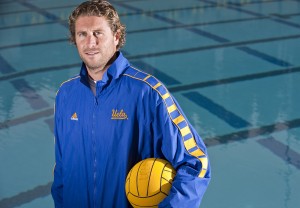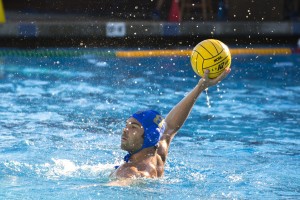Rare opportunities are the outgrowth of self-generated success.
Entrepreneurs and businesspeople know that. So does UCLA men’s water polo.
The 2014 national championship trophy has been sitting in the J.D. Morgan Center long enough to gather dust, and the banner at Spieker Aquatics Center has faded slightly from the sun – reminders of the December dethroning of a six-year ruler in the water, rival USC.
However, a trophy and a banner aren’t enough to prompt the Bruins to hang up their suits just yet – and while USC proved to be their toughest competition in California, the Trojans are not the most daunting opponent the Bruins will face this year
Due to their proliferating victories during the season and ultimate first-place finish, UCLA has been presented with the opportunity to test its new chemistry in international waters as representatives of the United States at the World University Games in South Korea July 3-14.

Repeat representatives
During the 2013 World University Games in Russia, when UCLA represented the United States for the first time as a unit, coach Adam Wright told ESPN that attending the games was a “once-in-a-lifetime opportunity” for the Bruins.
Now it looks as if a flight overseas to play in the multi-sport international competition is a twice-in-a-lifetime opportunity for some of the team’s players.
Senior defender Anthony Daboub, junior attackers Ryder Roberts and Jack Fellner, junior defender Chancellor Ramirez and junior center Alec Zwaneveld will experience the games a second time after serving as key pieces for the 2013 U.S. team who ousted Japan, 8-7, for fifth place.
UCLA’s water polo presence in the games has taken a dramatic leap in the past decade. Only one Bruin traveled overseas in 2009 and 2011. In 2013 and now 2015, UCLA players made up the entirety of the roster – largely correlating with the Bruins’ rising dominance in college water polo.
For Wright, the 2015 games will be a third opportunity.
After competing as a player in the 1999 World University Games, Wright returned to the games in 2013 to coach Team USA. In July, he will be traveling back as the United States’ coach for the second time in a row. In Wright’s unique situation of seeing the games evolve over a span of 14 years, he has noticed an increased grandeur in the Olympic-esque competition.
Wright referred to the games as “the Olympics with an age cut-off,” complete with a full village for the athletes.
“The overall experience of the game has completely changed,” Wright said. “It’s quite shocking to see that in reality, it’s like the Olympics. It’s the closest thing to the Olympics, and they really gear toward what the Olympic Games are doing.”
Heightened competition
While water polo is overshadowed in the United States by other sports in terms of popularity, its fan base in Europe is much larger. With the increased popularity comes increased exposure to the sport, ultimately resulting in an amassing of players with skill sets that have been developing since early youth.
UCLA had three international players last season, each with an extensive background in water polo. Australian junior center Gordon Marshall, who was responsible for breaking the 8-8 tie against USC in the title game with 34 seconds left, will be competing with the Australian national team over the summer.
The Bruins have no international players on the World University Games roster, and for the young American natives taking the trip across the Pacific for the first time, the transition from the national level to the international level will be an eye-opening experience.
“(The international players) play water polo every day, they’ve been playing since they are super small and they’ve had the best coaching,” Daboub said. “They’re on a whole other level. They move a lot better in the water, they shoot better, they’re smarter out there. A lot of them play professionally now. … It’s their life.”
Like Daboub, the older players who will be traveling to the World University Games a second time have been tested in the water against daunting foreign competition. However, youth will outnumber the veterans on the roster, with eight players making their World University Games debut in July.
“I just want to instill confidence in them,” Roberts said. “I know that for some of them, they’re probably a little nervous going overseas for the first time and playing. … Water polo is really a mental game, and if you don’t have confidence you won’t play well.”
Self-assuring words and pointers are the best that veterans can do, as no players on the roster know what to expect when their plane lands in South Korea.
According to Roberts, no one can know for certain who the biggest competition will be for the United States until they walk onto the pool deck and watch games. Due to the age cut-off, each country’s team is likely to change during the span between the World University Games.
The broad nature of the international competition and lack of information beforehand condenses into an ambiguous cloud over the Bruins’ first matchups against Russia and Turkey. However, Wright said that the uncertainty goes both ways.
“We don’t know anything about anyone, and I don’t think they know anything about us,” Wright said. “We’ll hopefully get a chance to see (Russia and Turkey) through training, and we’ll get to see one of them play their first games … but for our first game, we are kind of going in blind.”
In the 2013 games, Russia brought its full national team to the Aquatics Palace in Kazan and took second place overall. However, rather than speculate about the talent in their competition this year, Wright is concentrating on improving the Bruins’ efficiency in transition, defense and 6-on-5 strategy.
“It’s not about what they’re going to do, it’s about how we’re going to play, what kind of intensity and commitment we play with,” Wright said. “Are we going to be intimidated because we are playing national teams – maybe guys that are stronger than us – or are we just going to play our game? If we play our game, I know we can play with anyone over there.

Newcomers in the cage
The 2013 Bruins had a “wall” in the goal while in Russia.
Then a freshman, junior goalie Garrett Danner made a statement at the 27th summer games, topping all international goalkeepers in saves and steals. In his sophomore year at UCLA, he tallied 233 saves.
Danner won’t be playing in South Korea.
A minor injury prompted Wright to make a last-minute adjustment to the roster in order to give Danner time to rest up before September. Incoming freshman Alex Wolf and sophomore Alek Ruzic will be going in his place.
Danner started in 25 games for the Bruins during the collegiate season, while seniors James Hartshorne and Stephen White had a combined seven starts. Ruzic had zero minutes of play time, and Wolf has yet to compete with the Bruins.
Wright sees the World University Games as a chance for the rookies to start positioning themselves to be an integral part of the fledgling Bruin team.
“Somebody has got to step up and play this role and also challenge (Danner) for the starting goalie,” Wright said. “It’s a great opportunity for them to demonstrate to the team that they can be that person. Are they going to be(Danner)? No, we don’t expect them to be. But we do expect to learn a lot about these two.”
The veterans traveling back to the games aren’t worried about the goalie adjustment. Roberts said that it doesn’t matter how young the goalie in the cage is, or how many minutes they’ve played – water polo is centered on faith in one’s teammates.
“We play the same defensive schemes no matter who’s in the goal,” Roberts said. “It really depends on the goalie trusting the guys in the field. As long as he can trust us and we can keep his trust, I think he’ll be just fine.”
Gearing up for September
After UCLA’s loss in exhibition to Brazil’s national team at Spieker Aquatics Center on March 27, Wright said that the Bruins have progressed and integrated new pieces well.
“We’ve come a long way,” Daboub said. “I know that our team is really young. In these last couple weeks before Korea, we’ve grown together as a team and started to learn each other’s tendencies. … That’s the most important thing.”
The games will be a high-intensity trial run for the Bruins after the departure of the “Great Eight” seniors. The important roles the seniors left open must be filled in order for UCLA to defend its title in the fall.
The World University Games will be a chance for young Bruins to prove their ability to tread international waters and stay afloat against top players in the world. Whatever they falter in will be added on the list of things to improve during late summer training before UCLA plays its first game of the season.
“(Wright’s) a great coach, and we’ll take the games and make adjustments as needed,” Roberts said. “We’ll be ready to play our best (in the fall).”
Wright sees the games as just a part of the process – the Bruins’ global rank in Korea won’t determine their national rank next year. The World University Games team is small in comparison to the coherent unit that unifies in September.
“(The games) will help us identify how we’re going to play, who we want to become – what our characteristic as a team is going to be,” Wright said. “We’re going to be tested over there. There are going to be teams, no doubt, that are more skilled and have played at a higher level than us, but that doesn’t mean that we can’t compete and give ourselves a chance to win. … It’s a big step towards a championship.”
And it’s an opportunity – an opportunity for newcomers to prove themselves, for Bruins to represent their nation overseas, for creating a link between rookies and veterans.
It’s an opportunity UCLA men’s water polo worked hard to receive.
